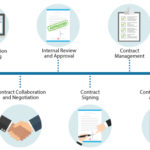11 things to consider when choosing a sales CRM for your business
Businesses continue to adopt customer relationship management (CRM) software at an increasingly rapid pace as customers become the centre of focus and competition intensifies. The global CRM market is expected to reach $48.4 billion by 2020 and 62% of CRM is expected to be cloud based by 2018.
The market is dominated by mainly four players: Salesforce.com, Microsoft, Oracle and SAP. However, there are many other smaller vendors that offer comparable services, which can be particularly suitable for small businesses and startups.
Implementing a CRM is an investment that should be made after much thought. Here are some factors that you should consider before selecting a CRM.
1. Your objectives
It is imperative that you know what exactly your goals are and what you need to solve by implementing the software. Some of your goals could be reducing cost per sale, improving client retention rates or forecasting sales accurately. Once you have identified your needs, you can compare features of different CRMs and choose accordingly.
2. Cost
Cost is an important factor, especially, for small businesses with limited budgets. According to a research by Capterra, on an average, businesses spend $150 per user, while 61% spend over $50 per user per month. Your objective is to minimize cost, but if the software costs you more than the benefits you get out of, it is futile to implement it. You will find most of the prices on vendors’ websites. However, most vendors offer different payment plans. So, before committing to one, understand the level of features your business requires.
3. Functionality
An ideal sales CRM should help you manage and track the entire sales process. It should provide you with the means for effective CRM pipeline management so that you can track each stage of the process. Also, the software should be accessible across the organization for faster processing time of any deal. A seamless process will give away a positive first impression of your company.
4. Usability
An important part of implementation is adoption. If your employees are hesitant to adopt the new software, then it is useless to implement it.
According to Ian Altman’s article on Forbes, a company should implement a CRM that employees will actually use. If you implement a sophisticated tool, then two things might happen: either your team won’t use it or spend too much time entering data on it, which will take away their focus from revenue-generating activities.
5. Mobility
Owing to the changing trends, most vendors now offer cloud-based solutions. A sales CRM should particularly be web-based since a sales team is mostly travelling. The software should always be available when it is needed.
If the sales team has to wait to get back to office to fetch for information or update it, then it is likely that it would be considered as a hassle and won’t be used at all. Hence, before selecting one, check if it runs on smartphones and tablets.
6. Integration
Integration is an important aspect of CRM. Integrations allow two or more apps to work together. With integrations, you can conduct all activities in one place, which saves time. Some integrations that a CRM should have include email and calendar sync so that all your activities between CRM and personal email are in a sync.
Marketing automation tools such as MailChimp can prove to be very useful for sending emails in bulk. Documentation management tools such as Pandoc are among sales reps’ favourites. These apps can create proposals and quotes within the CRM. Also, it can manage electronic signatures and automatically pick contacts names and addresses, eliminating any chances of error.
7. Customization
Each business is different and has its own requirements, which is why there is no one-size-fits-all CRM available in the market. If you want to get the most out of your investment, then make sure the CRM you choose offers customization. Some vendors allow you to select only features that you want. A CRM can be easily tailored according to your needs through plugins, themes and add-ons.
8. Security and Backup
Once you adopt a CRM, it will become the heart of your organization, which is why security is the most critical factor that should determine the choice of your CRM. Make sure that your data is kept private and secure at all times. Also, check the backup policy of the vendor. It is better if the backup is in real time and on a separate server, so that in case of a mishap the downtime is as minimum as possible.
9. Scalability
A good CRM allows you to scale up or down depending on your business needs. Make sure that the CRM you select has features that allow you to add more users and integrate more departments. While looking at scalability, also keep in mind the cost factor. Most vendors charge per user. Initially, when your business is small, it would cost less with fewer users. However, your cost will increase once your company grows.
10. Customer support
Excellent customer service is one of the most important factors that sets a company apart from its competitors. Make sure that the CRM you select offers customer support through phone, emails and live chats. Since most of your activities would be conducted from the CRM, it would be better if you communicate with your customers through the CRM as well.
11. Data portability
Your life will become easier if you can simply import and export data out of your CRM. Most of the software allow you to do that through Excel. Check that the CRM you select allows you to import your notes and contacts.
Shifting completely to a CRM can be a big step for a small business. The CRM, however, will only be useful if it is implemented correctly. Resistance to any change is quite common, but if you implement a CRM that matches your sales process and if you conduct proper training for it, your employees will be more likely to adopt it with comfort and ease.
Author bio:

Erica Silva is a blogger by choice. She loves to discover the world around her. She likes to share her discoveries, experiences and express herself through her blogs. Currently, she is associated with Airg Team for development work. Check out her firm’s performance reviews.
Find her on Twitter: @ericadsilva1
















